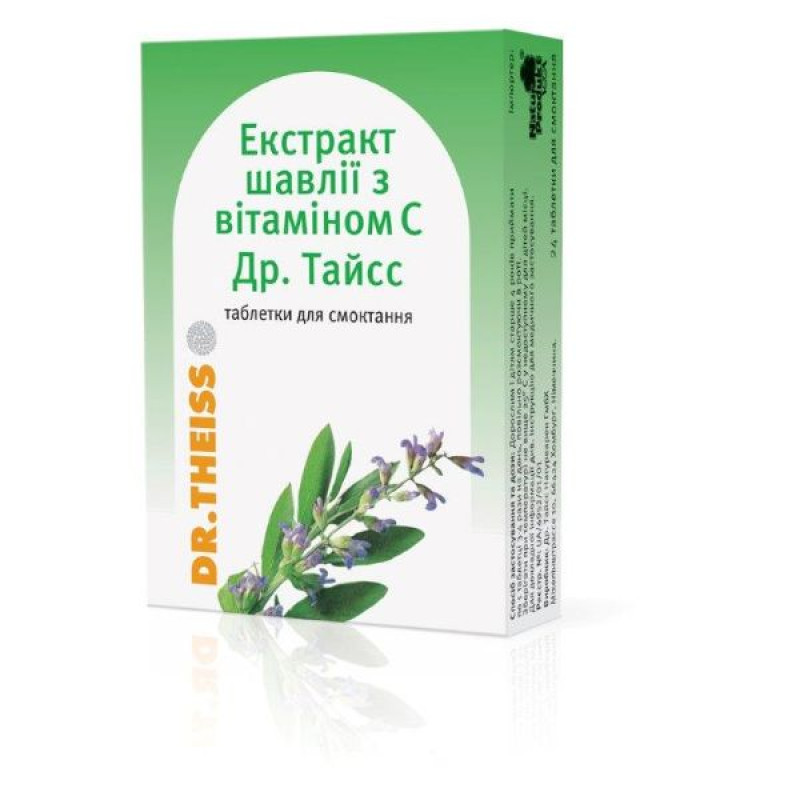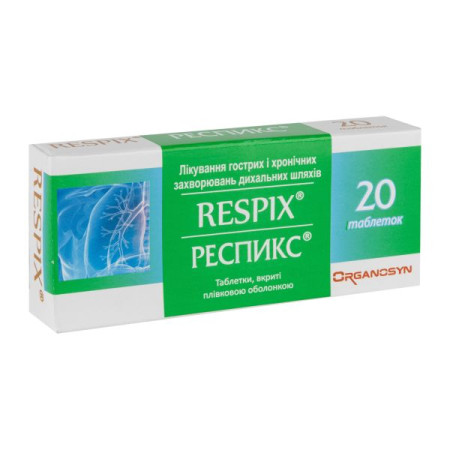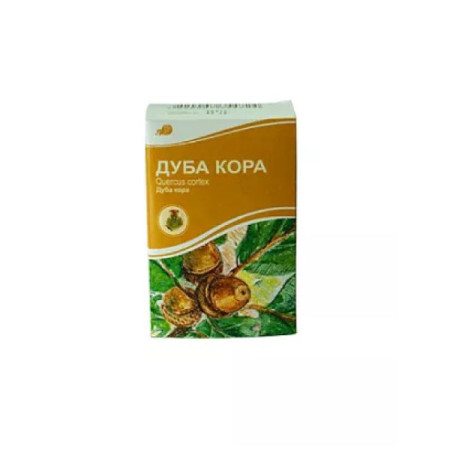Sage extract with vitamin C Dr. Theiss lozenges No. 24

Instructions Sage extract with vitamin C Dr. Theiss lozenges No. 24
Composition
active ingredients: sage leaf extract (Salvia officinalis) (3.4-4.6:1), sage oil, ascorbic acid (vitamin C);
1 lozenge contains: sage leaf extract (Salvia officinalis) (3.4-4.6:1) – 50 mg, sage oil – 6 mg, ascorbic acid (vitamin C) – 20 mg;
excipients: stabilizing additive (ascorbic acid), anhydrous citric acid, glucose syrup, sucrose, purified water.
Dosage form
Lozenges.
Main physicochemical properties: round tablets of light brown color with a characteristic odor.
Pharmacotherapeutic group
Drugs used for throat diseases.
ATX code R02A A20.
Pharmacological properties
Pharmacodynamics
The main active ingredients - sage extract and sage oil - have a pronounced anti-inflammatory, disinfectant, astringent and expectorant effect.
Vitamin C helps boost immunity, which is important for colds.
Sage extract with vitamin C Dr. Theiss disinfects the oral cavity and nasopharynx, promotes sputum discharge and rapid recovery from colds and infectious diseases of the upper respiratory tract accompanied by cough.
Indication
As part of the complex therapy of infectious and inflammatory diseases of the upper respiratory tract, accompanied by cough; diseases of the mucous membrane of the oral cavity and pharynx: stomatitis, gingivitis, pharyngitis.
Contraindication
Hypersensitivity to the components of the drug.
Interaction with other medicinal products and other types of interactions
Taking sage preparations may affect the effect of drugs that act through GABA receptors (barbiturates, benzodiazepines), so simultaneous use with such drugs is not recommended.
Absorption of ascorbic acid is reduced with the simultaneous use of oral contraceptives, consumption of fruit or vegetable juices, and alkaline drinks.
Ascorbic acid, when administered orally, increases the absorption of penicillin, tetracycline, and iron, and increases the risk of crystalluria during treatment with salicylates.
Application features
The medicine contains sucrose and glucose syrup and should not be used in patients with rare hereditary problems of fructose intolerance or sucrase-isomaltase insufficiency. If you have been told by your doctor that you have an intolerance to some sugars, contact your doctor before taking this medicine. This medicine may be harmful to your teeth.
Note for diabetics: 1 tablet contains 2.34 g of carbohydrates.
Since the drug contains ascorbic acid, albeit in small amounts, it should be used with caution in the treatment of patients with glucose-6-phosphate dehydrogenase deficiency, a tendency to thrombosis, thrombophlebitis, diabetes mellitus, and severe kidney disease.
Due to the known neurotoxic effects of thujone contained in sage, its intake should not exceed 5 mg per day. The thujone content in 1 lozenge varies between 0.22-0.42 mg.
If symptoms worsen or persist during treatment for longer than 7 days, or new symptoms of unknown etiology appear (fever, sweating, weight loss), you should definitely consult a doctor.
Use during pregnancy or breastfeeding
There are no sufficient studies on the use of this medicine during pregnancy or breastfeeding, so the drug is not recommended during this period.
Ability to influence reaction speed when driving vehicles or other mechanisms
Any effect on the ability to drive or operate other mechanisms is not expected.
Method of administration and doses
Adults and children over 12 years of age should take 1 tablet 3–4 times a day, slowly dissolving in the mouth.
The course of treatment is determined by the doctor, depending on the nature and course of the disease. Sage preparations should not be taken for longer than 2 weeks.
Children
Children under 12 years of age are not recommended to take the drug.
Overdose
There are no reports of overdose of the drug. However, excessive intake of sage preparations may cause gastrointestinal disorders.
Adverse reactions
Allergic reactions are possible, including skin rashes, itching, urticaria, angioedema, and sometimes anaphylactic shock in the presence of sensitization.
Expiration date
3 years.
Storage conditions
Store at a temperature not exceeding 25 ° C. Keep out of the reach of children.
Packaging
12 lozenges in a blister; 1 or 2 blisters in a cardboard box.
Side effects
Allergic reactions are possible, including skin rashes, itching, urticaria, angioedema, and sometimes anaphylactic shock in the presence of sensitization.
Vacation category
Without a prescription.
Manufacturer/Applicant
Dr. Theiss Naturwaren GmbH/Dr. Theiss Naturwaren GmbH.
Location of the manufacturer and address of its place of business
Michelinstrasse 10, 66424 Homburg, Germany.
Producer
Dr. Theiss Naturwaren GmbH/Dr. Theiss Naturwaren GmbH.
Address
Michelinstrasse 10, 66424 Homburg, Germany.
There are no reviews for this product.
There are no reviews for this product, be the first to leave your review.
No questions about this product, be the first and ask your question.








